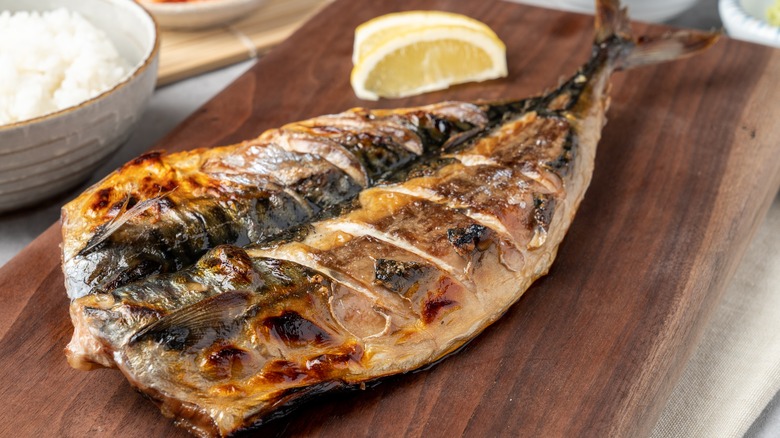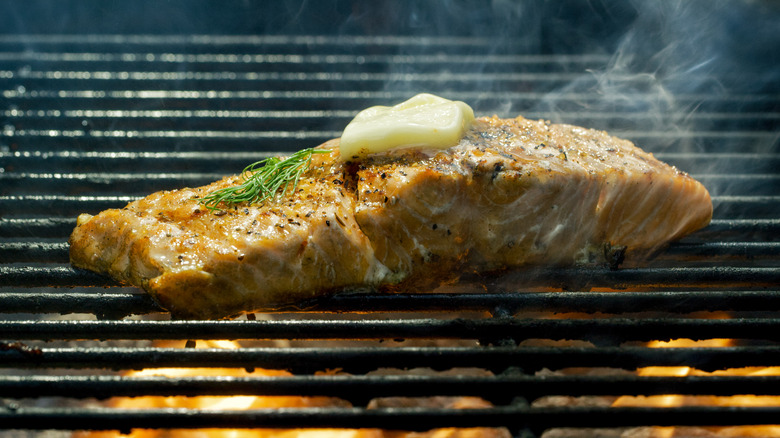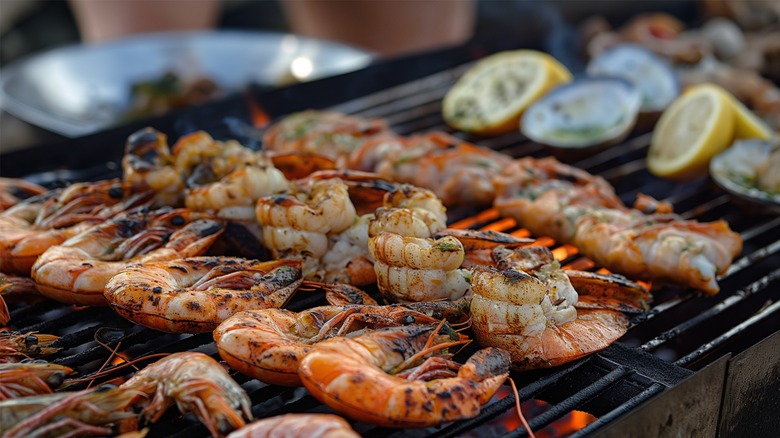Here's What Seafood Belongs On Your Grill And What Doesn't
Some ingredients shine best with minimal intervention: seafood is certainly an example. Especially when sourced fresh, it often only requires a light seasoning to emphasize its delectable flavors. It's natural to then toss the protein on the grill; it's the perfect high heat and fuss free vessel for the food. So the question arises — what types of seafood are fit for this preparation method?
Thankfully, Jonathan Bautista, executive chef at Ember & Rye is here to offer some help. He notes that "any seafood that is higher in oil content usually works well," so you'll want to favor any species rich in omega-3 fatty acids. That makes common favorites like salmon, cod, trout, and mackerel ideal candidates. He adds that "anything with 'steak' characteristics" is a great fit, too — after all, a tuna steak is a reliable grill classic.
And when it comes to the opposite side of the spectrum, Bautista advises "to steer clear of seafood with high moisture content, often a result of being frozen." So consider such details and you're well on your way to grilling a show-stopping fish dinner. Just a few careful decisions will result in a meal that impresses with its brilliant simplicity.
Consider fish built for high heat cooking on a grate
Selecting the right seafood for the grill is all about considering its interaction with the apparatus. Unlike other direct heat options like a broiler, you don't have precise temperature control to a degree. And as opposed to a pan, any excess fat will drip through the grates — great for aroma, but not for retaining moisture. Plus, there's the risk of losing food, too; Jonathan Bautista says to "avoid fish and seafood that are too thin and might fall through the grates."
Add up such factors, and it's easy to see why fish like salmon is a beloved grill favorite. It's large, high in fat, and flavorful, meaning there's not much to stress over. Fish high in fat and often sold skin-on is another terrific option; mackerel, trout, and snapper are all firm enough for outdoor cooking. And while they're low in fat, steaks of swordfish, mahi mahi, and tuna are all high enough in protein to not fall apart.
When it comes to cooking such cuts, you'll need to take more care in maintaining the moisture. Less fat means that unwanted dryness can settle in quickly, but if the doneness is right-on, then the fish is perfect. So keep a very careful eye on the internal temperature; it's the key to grilling perfectly moist swordfish.
Avoid frozen seafood on the grill
Such a fish selection isn't the be-all and end-all of grilled seafood. Chow down on some delicious grilled shrimp tacos, and it's clear that many other options will work too. "Most seafood is excellent when grilled," says Jonathan Bautista, so don't feel limited by the aforementioned recommendations. However, there is one big caveat to know — frozen foods won't fare well on the grill. There's just too much extra moisture, meaning it's likely you'll end up with a mushy mess.
Go with Bautista's recommendation that "fresh seafood is always better" and you'll quickly see delectable results. Freezing seafood affects the product on a cellular level, drawing out the moisture that's so needed on the grill. And the fats are affected, too — omega-3 acids deteriorate the longer they are held in frozen form. Opting for fresh seafood will give you a better consistency, and flavor.
That's not to say frozen seafood does not belong in the kitchen. Flash-frozen fish can preserve freshness and — especially if it's transported well — still be well set-up for culinary uses. If you don't live next to the ocean, then head to a trusted fishmonger, where flash frozen fish is properly thawed. Just avoid slow-thawing fish and other seafood, then throwing it on the grates yourself; this is where the excess water becomes an issue.


